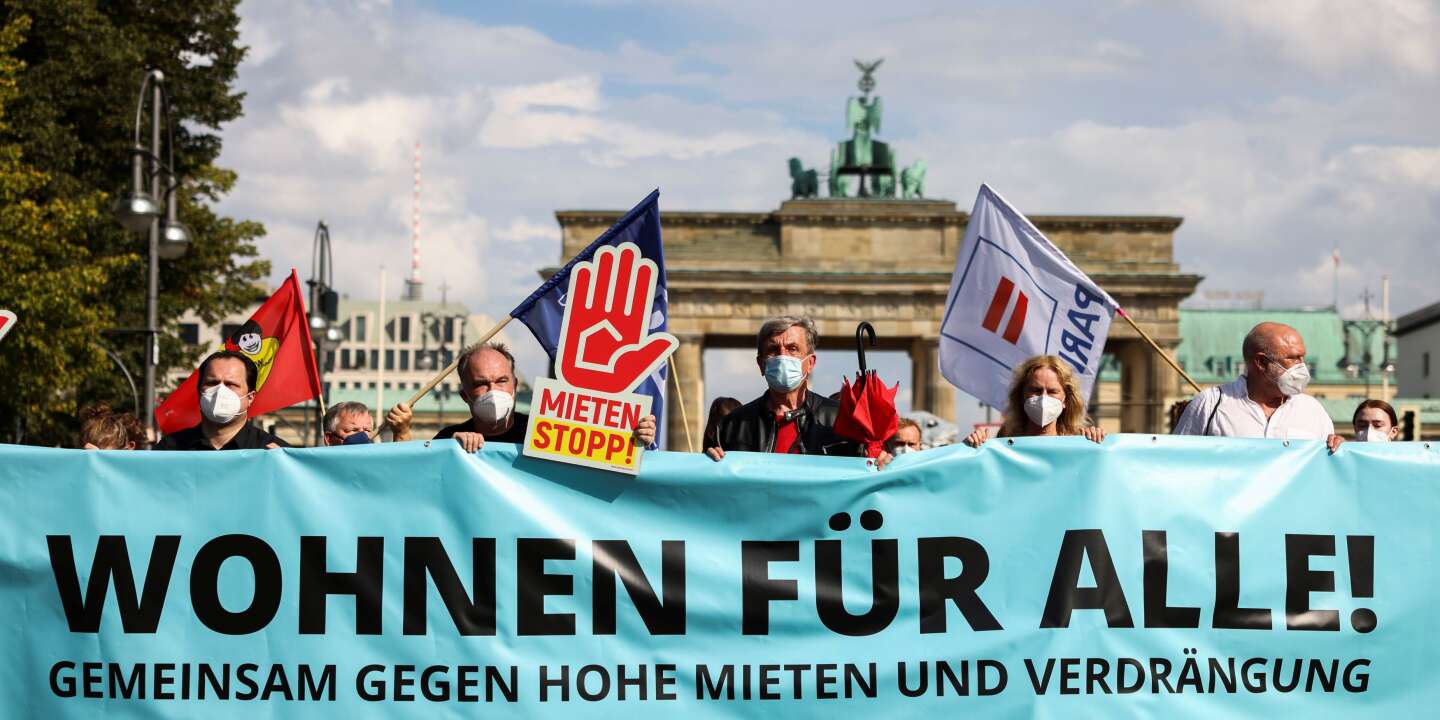A referendum took place in Berlin targeting the large landlords.

Source: Le Monde, Demonstration against high rents in Berlin, Germany, 11 September 2021. CHRISTIAN MANG / REUTERS
On September 26th, 2021, a majority of Berliners (56.4%) voted “Yes” on a provisional referendum calling the city authorities to pass a law to expropriate the main private real estate companies in Berlin and compensate them at a rate well below market value[1]. The large landlords targeted are specifically the companies that own more than 3 000 housing units such as Vonovia (VNAn.DE) and Deutsche Wohnen (DWNG.DE). According to "DW und Co. Enteignen" (Expropriate Deutsche Wohnen and Co.), organizers of the referendum, the aim of this measure is to reduce rents in Berlin by helping the city take control of about 240 000 apartments[2]. Although the referendum is not legally binding the campaign obtained 343 000 signatures, while 175 000 were needed to trigger a city-wide referendum[3].
Why are the large landlords targeted?
The concentration of housing in Berlin in the hands of big property owners has exacerbated the property crisis in the German capital. The company Heimstaden announced on the night of the referendum for example that they had just bought 14 000 new homes in Berlin. Vonovia, the largest German residential rental company, also recently announced it had reached the 50% threshold needed to buy its rival Deutsche Wohnen. The combination of the two companies would create a housing empire with 550 000 flats worth over 80 billion€[4].
Due to historical reasons, the city of Berlin is particularly affected by housing speculation. The city sold part of its real estate stock at very low prices after the fall of the Berlin Wall to hedge funds and private equity companies[5]. Their strategy is to buy housing units at low cost and extract value from them by rent increases and low maintenance, before selling them to other financial actors once the market has recovered. Moreover, “the city’s growth has outstripped the building of new apartments”, leading to a real housing scarcity[6].
This financialization and scarcity of housing have led the city to struggle with rents dramatically increasing over the last decade. Berlin became in 2018 the city with the fastest rising property prices in the world[7], and between 2009 and 2019 Berliners have seen the rents doubled[8]. As 80-85% of Berliners are renters[9], this situation does not only affect low-wage earners but most of the population.
Why would this measure be important for the affordability of housing?
Making part of the housing stock public would allow the implementation of rent control by the city of Berlin. Having public authorities regulating the rental market is a condition to ensure access to affordable housing for all. Rent controls are increasingly used across the EU (in different forms) and are becoming a key measure when the property market or social housing stock are unable to meet the needs of low-income and middle-class households. Increasing rent control in Berlin would then protect tenants from soaring prices and reduce the crowding-out effect on vulnerable households. It would act as an insurance policy to ensure that Berliner households do not lose their homes if their economic situation changes abruptly, and it can be a means of containing potential inflationary movements linked to the gentrification of certain areas in the city[10]. As housing is a basic necessity, it should not be subject to speculation. That is why the financialization of housing is increasingly denounced as an obstacle to the realisation of the right to housing[11]. In this regard, rent control defends the right to housing. More specifically, implementing rent control to the level of the city of Berlin would allow for better implementation and dissemination of information for the defence of the residents' rights.[12]
The proposed expropriation law faces political opposition, but the referendum could lead to further progress for the right to housing in Berlin.
Expropriating property owners faces legal and political barriers. First, when the coalition parties are divided on the issue, Berlin’s city mayor Franziska Giffey rejected the expropriations as she considered that this would not help to solve the question of affordable housing[13]. Second, there is a legal debate on the issue. If an expropriation law were to be accepted, it would surely be subject to legal challenges. In September 2019 the Berlin House of Representatives stated that the proposal was compatible with the German Basic Law[14]. However, in April 2021 Germany's Federal Constitutional Court overturned the Berlin state government's decision to impose a five-year rent cap in the city[15].
Nevertheless, this initiative has put pressure on the issue and could lead to progress in terms of defending the right to housing in Berlin. As more than one million people voted in favour in an official referendum, this gives considerable popular support to the initiative. For Kalle Kunkel, spokesman for the initiative, "ignoring the referendum would be a political scandal"[16]. Finally, despite her reservations, the city mayor stated that the results of the referendum should be respected, and she called on the Berlin government to draft a bill and conduct a legal review of it.
[4] Ibid 2.
[5] Ibid 3.
[6] Ibid 3.
[9] Ibid 3.
[10] Encadrement des loyers, C’est le moment d’agir pour les villes, Fondation Abbé Pierre, 2020.
[11] Sixth Overview of housing exclusion in Europe, Chapter 4: Legal developments, rent regulation in the EU, Fondation Abbé Pierre, FEANTSA, 2021.
[12] Ibid 10.
[13] Ibid 1.
[14] Ibid 1.
[15] Ibid 1.
[16] Ibid 2.




